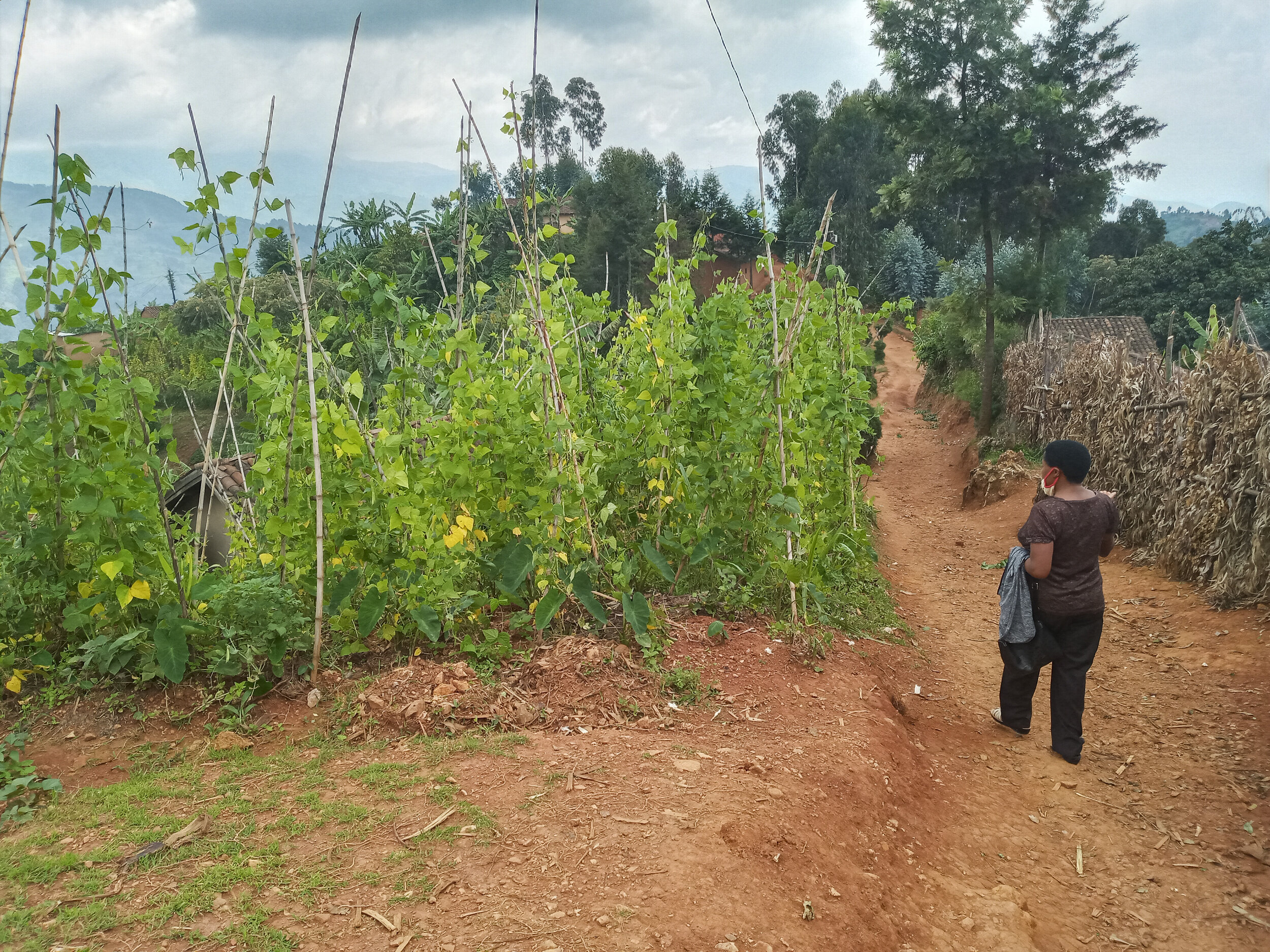Ensuring equitable nutrition and food access through partnerships: WFP highlights
Gardens for Health, in partnership with the UN World Food Programme, is striving to provide access to balanced nutrition to all children. Our agriculture, health, and nutrition trainings at schools across Rwanda provide important tools for sustainable sources of nutritious veggies and accessible approaches to cultivation in difficult climates — particularly during COVID-19.
Meet Elisabeth.
For headmistress Elisabeth of Nyakarira Primary School, good health is a matter of education. “We live in an extremely poor community, with arid land that causes high rates of malnutrition,” explains Elisabeth. “But after GHI’s lessons, we learned multiple ways to grow vegetable gardens here — even those who do not have farmland can grow their veggies in a bag!”
Agriculture and nutrition trainings from Gardens for Health in partnership with the UN World Food Program have strengthened health systems at Nyakarira Primary School and in the surrounding community. “Before, we had planted gardens, but they were poorly kept and had a meager yield. These trainings increased our vegetable yield (I can even go six months before I need to buy veggies at the market), and we no longer have a vegetable shortage.”
Elisabeth lists off some particularly helpful lessons. “We learned how to elevate the ground so that the vegetable plants would not be damaged by heavy rain. Or, we can make our own compost using easily accessible materials, such as dried wood, leaves, and manure, rather than chemically-based fertilizers.”
The One Pot, One Hour lesson is another hands-on favorite. “With this method, our students eat a mix of vegetables in one meal,” says Elisabeth. “Children look forward to lunch time, and they’re excited to take charge of cooking a balanced meal in only an hour. As educators, all that we do is monitor the steps: washing the vegetables, measuring quantities, and timing. All of our students know how to prepare a balanced meal, and at the end of the school year, they’re even assessed on One Pot, One Hour.” Elisabeth also notes that, along with vegetable seeds and seedlings, students often bring home knowledge of how to create a balanced meal.
Tackling malnutrition in Ruhango really is a community effort. During a country-wide lockdown due to COVID-19, Elisabeth’s own home garden was a source of both water and diverse vegetables for struggling neighbors. The school garden, too, encourages community members to help themselves to an assortment of leafy greens.
Step-by-step, Elisabeth is spreading the message when it comes to good nutrition, combating misinformation along the way. “Once, one of my neighbors noticed that I had planted a lot of vegetables, telling me they were not good for my health. ‘You will never be strong!’ That day, I took the time to teach him about the value of vegetables to him and his children. I shared some seedlings, and now he even has his own garden. It’s not perfect,” she laughs, “but it’s a good start!”
Sure enough, Elisabeth’s message is effective in a seemingly hard-to-cultivate area. “All Rwandans should be aware that they have the keys to ending malnutrition,” Elisabeth nods.
Meet Laurence.
Grade six student Laurence is like any other kid. She likes to play with her brother, does her chores around the house, and helps out in the family garden. And, like many children her age, she’s naturally curious. “My favorite subject in school is science. I love learning about new discoveries.”
At school, Laurence’s curiosity also feeds her interest in the school vegetable garden. “I loved planting vegetables and seeing them grow over time. And after I learned that vegetables had a lot of health benefits and would allow me to have better vision, I loved growing vegetables even more!”
The school garden has given Laurence both a hands-on opportunity to learn valuable agriculture and nutrition lessons, as well as a lot of responsibilities. While her main job is to weed the garden, she also watches over her peers, ensuring the garden guidelines are well-followed, in addition to helping with the harvest and selling and buying veggies at the local market.
The lessons have paid off well. “I taught my parents how to prepare the soil before planting vegetable seeds, how to pull weeds, and also how to compost. And, with the seedlings that my teacher gave me, my family was able to set up a vegetable garden in our backyard.” Now, Laurence and her family have a consistent supply of amaranth, onions, and green bell peppers.
But, Laurence’s ambitions don’t end at home. “When I grow up, I wish to become a teacher. Then, I can teach others the importance of vegetables and the benefits of a balanced meal!”
Meet Christine.
“Having a garden at home has been so important,” says mother-of-three Christine. “Before we had a garden, my children were malnourished. But after we received a variety of vegetable seeds — along with trainings — from Gardens for Health, we could provide our children with good nutrition. They’re now healthy.”
In fact, GHI trainings in partnership with the UN World Food Programme contributed to more than the health of Christine’s own family. “We were additionally able to help our neighbours, who also struggled with malnutrition, by providing them vegetables. Now their kids are also in good health.” Christine’s home garden was particularly helpful during COVID, consistently providing the family with nutritious veggies and preventing relapse into malnutrition.
Christine’s children were the ones to spark change. At school, they learned efficient and accessible agriculture techniques and how to create a balanced diet, then brought their knowledge home. “We learned a lot from our children on how to best prepare a vegetable garden. They were the ones to bring new vegetable seeds (like spinach) home and show us how to plant them. They also taught us other methods, like mixing greens into our fertilizer.” New seeds and knowledge meant new possibilities. “We expanded our garden with vegetables that were new to us, and now my children can eat veggies and sell the surplus at the market.”
Of course, challenge is no stranger to farmers like Christine. “We faced difficulties, but were able to overcome them. Sometimes, the soil is poor, or there is too much sun, or there is too little space for planting. But we were able to plant some of our crops in sacs, and we added natural fertilizer and manure to the soil.”
Ultimately, Christine is resilient for her children. “I want my children to study, perform well in school, and earn their degrees. I also want them to stay healthy and take responsibility for their health. And as for me,” Christine concludes, “I will continue supporting them in any way I possibly can.”
Story by Jessica Wright, interviews and photos by Maïli Mia Sugi Gasakure.









